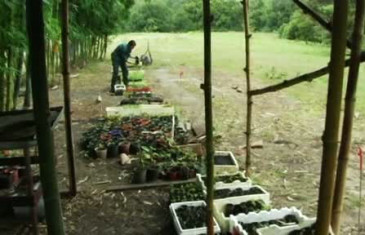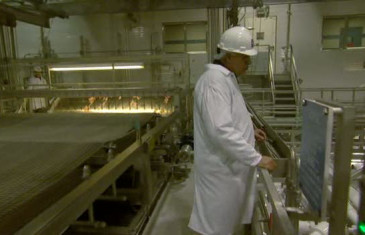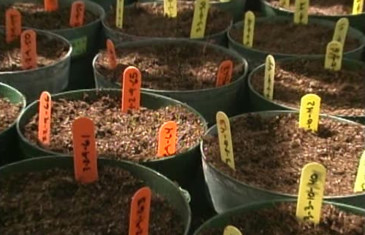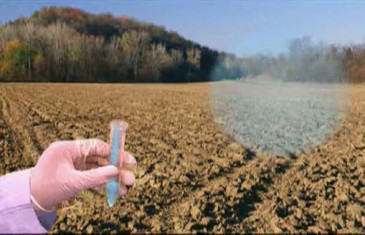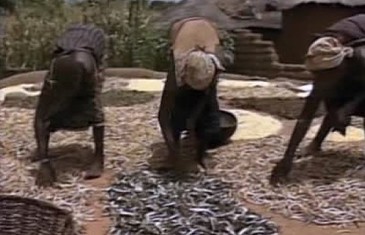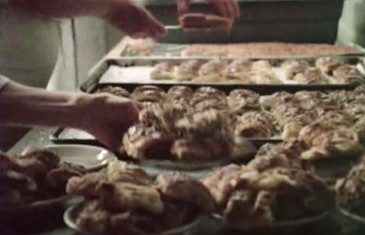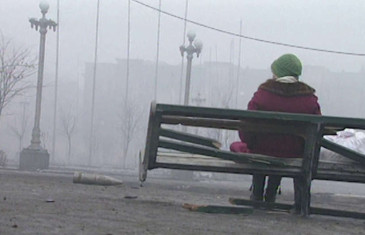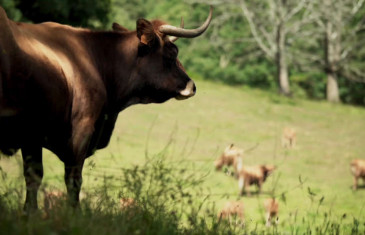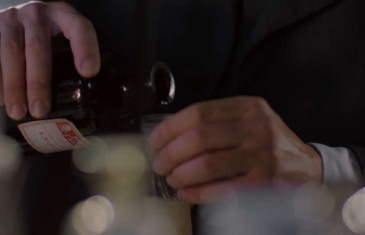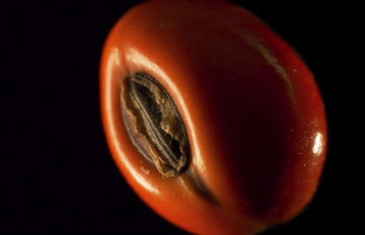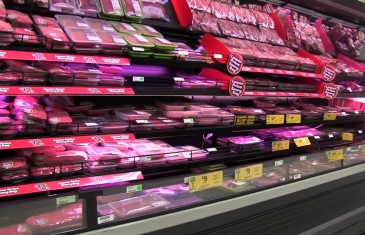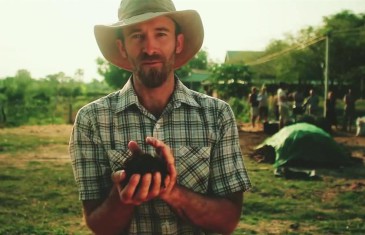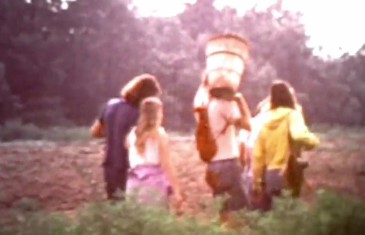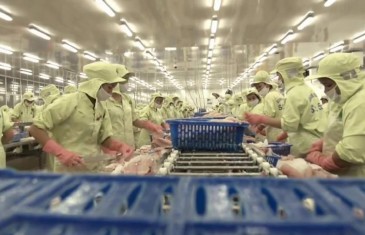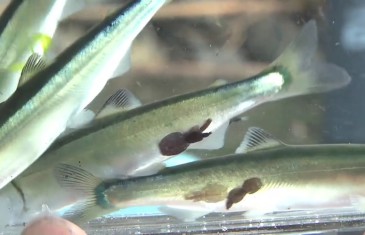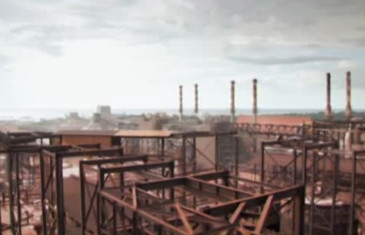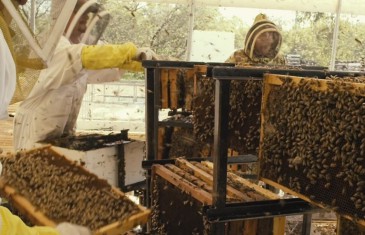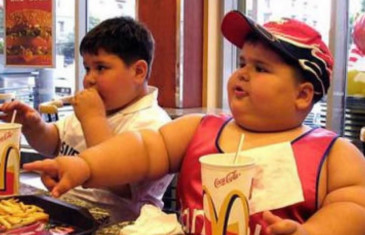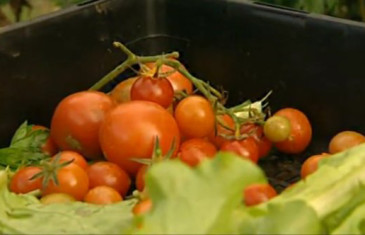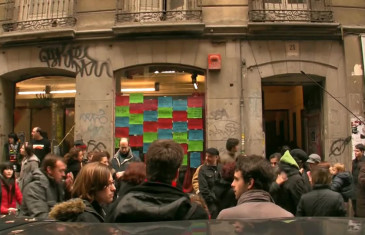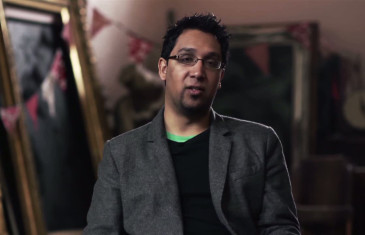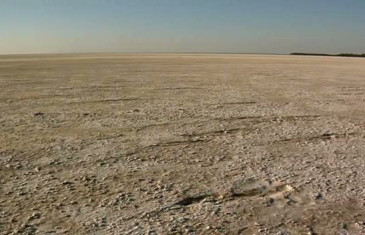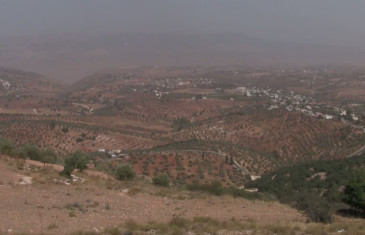Search Results
Going from classroom to real world, Establishing A Food Forest The Permaculture Way explains the patterns of a Food Forest and the essential principles of building a self-sufficient, sustainable way to eat. The film ends up at Tagari Farm which was abandoned years ago, but planted according to permaculture design principles. Did the Food Forest survive on its own?
What does the corporate-controlled food industry look like? Film-maker Robert Kenner lifts the veil on today’s food industry, exposing the underbelly that has been hidden from view of the consumer with the cooperation of government regulatory agencies such as the USDA and FDA. The food supply is now controlled by a handful of corporations that put profit ahead of consumer health, the livelihood of the farmer, the safety of workers and of course, the environment. We have bigger-breasted chickens, the perfect pork chop, herbicide-resistant soybean seeds, even tomatoes that won’t go bad. But we also have new strains of E. coli—the harmful bacteria that causes illness for an estimated 73,000 Americans annually; are riddled with widespread obesity, particularly among children; and an epidemic level of diabetes among adults. And the whole mess is exacerbated by opportunistic politics—the tools of Big Agriculture running the very regulatory agencies that are supposed to protect the public—and consumers who have become accustomed to eating whatever they want whenever they want, in quantities they don’t need…
In the “race to feed the planet”, scientists have discovered how to manipulate DNA and produce what they claim are stronger, more disease-resistant crops. However, fears that Genetically Modified Food may not be safe for humans or the environment has sparked intense protest. Are we participating in a dangerous global nutritional experiment? This film asks is the question — is the production of genetically modified food a panacea for world hunger or a mass poisoning of the worlds food supply?
The Future of Food brings together the many complex issues surrounding the troubling changes that have occurred in the industrial food system during the past decades—genetically modified food, seed patenting, pesticides; and the corporate takeover of the entire food chain, from soil to seed to fork. The issues raised in The Future of Food are more pressing than ever, as the collusion between governments and large multi-national corporations is more visibly on display than ever before—the use and abuse of the legal system, politicking, and privatisation drive this rapacious strangle hold on much of the world’s food. The film focuses on unlabelled, patented, genetically engineered foods that have been sold in supermarkets in the United States, unbeknownst to the public, for the past decade. In addition, there is a focus on Canada and Mexico. Also described is the concern about ‘terminator’ GMO seeds that pose a huge threat to diversity and local food systems. Genetically modified food is as controversial today as ever, and The Future of Food presents a vital educational tool for activists and educators worldwide.
Is the human population going to outstrip the Earth’s food supply? The effects of modern agriculture not only lead to a short term food surplus which quickly slipped as population boomed, but agriculture itself causes huge environmental problems such as soil erosion, salinity and chemical pollution—all further illustrating an impossible system in perpetuity. Food or Famine looks at projects in North America, Chile, Indonesia, Africa and India which are participating in a worldwide movement to return to local food growing methods based on the land and healthy ecological principles. The film also examines the worldwide imbalance between food consumption and production, stoking the need to confront the mounting challenges ahead…
Founded in 1976, the United States Office of Multilateral Diplomacy–known informally as the Zap Office–was created by Henry Kissinger to try and influence the voting patterns of third world nations at the United Nations by withholding food aid to those who did not vote alongside the United States. Zap! The Weapon Is Food is an investigation of this policy, one that makes food more powerful than oil…
Since the late 1980s, BBC news crews have filmed all across the Soviet Union and Russia, but only a tiny portion of their footage was ever used for news reports. The rest was left unseen on tapes in Moscow. Filmmaker Adam Curtis obtains these tapes and uses them to chronicle the collapse of the Soviet Union, the rise of capitalist Russia and its oligarchs, and the effects of this on Russian people of all levels of society, leading to the rise to power of Vladimir Putin, and today’s invasions of Ukraine. The films take you from inside the Kremlin, to the frozen mining cities in the Arctic circle, to tiny villages of the vast steppes of Russia, and the strange wars fought in the mountains and forests of the Caucasus.
A group of friends become curious about the sustainability of their eating regiments. They instigate a challenge, and send filmmaker Yasi Gerami off on a quest to investigate the sustainability of their eating ideologies. The friends come from different backgrounds and live in Toronto, Canada, but the inquiry takes the story of their food around the globe. As Gerami digs deeper, she realises the inconvenient truths not only about the environmental catastrophes caused by our dependence on mainstream food production methods, but also by the cataclysmic social justice impact of our eating habits in the global south. The film unfolds some popular myths on topics such as plant-based diets, healthy and nutritional foods, ethical eating, food politics, industrial agriculture, and how to attain a sustainable food culture. Sustenance helps the viewer discover these themes, prompting the viewer to question where our food really comes from, and how it genuinely affects the health of other people, other species, and ultimately the entire planet.
By the close of the Industrial Revolution, the food supply in the United States was tainted with frauds, fakes, and legions of new and untested chemicals, dangerously threatening the health of the public. The Poison Squad, based on the book by the same name from author Deborah Blum, tells the story of Dr. Harvey Wiley, a government chemist who was determined to banish these dangerous substances from dinner tables, and so took on powerful food manufacturers and their allies. Wiley embarked upon a series of bold and controversial trials on 12 human subjects who would become known as the “Poison Squad.” Following Wiley’s unusual experiments and tireless advocacy, the film charts the path of the forgotten heroes who together laid the groundwork for consumer protection laws in the United States, and ultimately, paved the way for the creation of the Food and Drug Administration.
Miraculous and vital, Seed–The Untold Story follows passionate seed keepers that are tirelessly working to protect a 12,000 year-old food legacy. For only in the last century, 94% of seed varieties have disappeared, as biotech and chemical companies rapaciously took over control over the majority of the world’s food seeds. Farmers, scientists, lawyers, and indigenous seed keepers fight literally a battle for life to defend the future of food. In a harrowing and heartening story, these heroes rekindle a lost connection to a treasured source of life, and revive a culture connected to food, and the Earth.
Sugar Coated investigates a once secret public relations campaign, dating back to the 1970s, where the sugar industry deflected threats to its multi-billion dollar empire from scientific research emerging implicating processed sugar with adverse health effects. In order to continue sweetening the world’s food supply, thus securing continued profits, the sugar industry turned to the very same deceptions and tactics lifted from the tobacco industry. Using big sugar’s own internal documents on this strategy, Sugar Coated reveals the well-oiled tricks of the trade to confuse the public about what is really driving the global pandemic of obesity, diabetes, and heart disease. Will we be fooled again?
Lucent is a grim accounting of the realities of factory farming in Australia. Documented are some of the conditions and day-to-day operations of industrial meat production—from farrowing crates or cages, to artificial insemination, to so-called free range; and of course, to mechanistic slaughter devoid of exchange. The film focuses mainly on pigs but also briefly looks at the issues facing other animals raised and killed for food in industrial conditions.
Not only with climate change and the inherent destructiveness of agriculture compounding the current ecological crisis and the need to systemically change things, Seeds of Permaculture follows a group of westerners that travel to Thailand to experience, explore, learn and teach about permaculture systems as a means to try and step out of their way of life and reconnect with cultures past-and-present about traditional knowledge pertaining to food and the land. With education and inspiration as the main thread, the film follows the westerners as they learn about composting, solar heating, food forests, composting toilets, natural building, and earthen ovens. The goal is to empower and excite you, the viewer, about the possibilities of listening and reconnecting with the land where you live.
In 1970, 1,500 hippies and their spiritual guru Stephen Gaskin founded a commune in rural Tennessee, United States. Members gave over their life savings, grew their own food, delivered their babies at home and built a self-sufficient society. Raised in this alternative community by a Jewish mother from Beverly Hills and a Puerto Rican father from the Bronx, filmmakers and sisters Rena and Nadine return for the first time since leaving in 1985. As well as facing their past after years of hiding their upbringing, they chart the rise and fall of America’s largest utopian socialist experiment and their own family tree. The nascent idealism of a community destroyed, in part by its own idealism, is reflected in the personal story of a family split apart by differences. American Commune finds inspiration in failure, humour, and most surprisingly, that community values are alive and well in the next generation.
Salmon Confidential follows renowned biologist Alexandra Morton as she finds that wild salmon are testing positive for dangerous European salmon viruses associated with industrial salmon farming worldwide, and then, how a chain of events is set off by the Canadian government to suppress the findings. Scientists are gagged, research suppressed, evidence not allowed. With the industrial fish farms having moved into Morton’s neighbourhood in the late 1980s, since then, there has been a serious decline in wild salmon in the region. So, tracking her findings, the film follows Morton and her team as they move from courtrooms, to Canada’s most remote rivers, Vancouver grocery stores and sushi restaurants, providing insights into the workings of government agencies tasked with managing the ‘safety of fish and food supply,’ that always seem to put industry and the needs of corporations over the natural world, time and time again. Salmon Confidential becomes a call to action to help save the wild salmon from these atrocities, before they’re completely wiped out forever.
Aluminium is everywhere—beer cans, tinned food, cooking pans, computers, pens, cosmetics; and many medications, including most vaccinations. Though what do we know about this material? The Age of Aluminium profiles people whose health has been seriously impacted by unwitting exposure to aluminium; along with research exploring how aluminium as a known neurotoxin relates to the growing epidemic of chronic illnesses and disabilities such as breast cancer, Alzheimer’s disease, allergies, and autism. Aluminium mining and manufacturing have also created cataclysmic environmental problems in several parts of the world, as we see the devastating effects of aluminium mining in South America, and environmental disasters in Hungary and the UK. What are we doing with this material? And what can we do now to avoid the continued impacts on our lives and the natural world?
Over the past three decades, obesity rates in the United States have more than doubled for children and tripled for adolescents, and a startling 70% of adults are now obese or overweight. The result has been a widening epidemic of obesity-related health problems. But while discussions about this crisis tend to focus solely on the need for individual responsibility and more exercise, Feeding Frenzy turns its focus squarely on the responsibility of the processed food industry and the outmoded government policies it benefits from. It lays bare how government subsidies designed to feed the hungry during the Great Depression have enabled the food industry to flood the market with a rising tide of cheap, addictive, high calorie food products, and offers an engrossing look at the tactics of the multi billion-dollar advertising industry that makes sure that everyone keeps consuming.
With a lens of torturous mechanistic science, as well as the commercial perspective from farmers and commodity bee-keepers alike, More Than Honey is a film about the insanity of industrial agriculture and the consequential collapse of honeybee populations throughout the world. By looking through some of the industrial operations in California, Switzerland, China and Australia, More Than Honey is a visual exploration of colony collapse, drawing attention to the many symbiotic relationships that go unrecognised and uncared for by industrial operations and commercial food practices. If bees are so important to the health of so many other species of animals and plants and foods, how can we stand by and allow them to be killed?
Far from ending with the abolition of slavery, the trade in human beings is thriving more than ever before. Today, 27 million men, women and children are held, sold and trafficked as slaves throughout the world. From the sex slaves of Eastern Europe to China’s prison labour slaves; from Brazil’s hellish charcoal slave camps to entire families enslaved in Pakistan’s brick kilns, this series exposes the people behind modern slavery and the companies who profit from it.
Globesity exposes the explosion of global obesity by following how fast food corporations have infiltrated countries where just a few decades ago hunger was a headline health concern. The film travels to China where the consumption of sugar has skyrocketed, to Brazil where corporations such as Nestlé have fundamentally altered traditional diets, to India where it’s predicted that 100 million people will be suffering diabetes in the not-too-distant future, and on to Mexico–the biggest consumer of soft drink in the world–where diabetes is already the number one killer. The film is one illustration of many of how vast corporate operations further destroy traditional communities and usurp basic needs like food…
“Permaculture is a practical approach to the problems facing modern society, based on a philosophy of ‘think global, act local’. This video documents the transformation of a bare suburban house in Perth, showing practical examples from start to finish of how to grow organic food sustainably, how to reduce and incorporate household waste, evaluate energy consumption, and recreate habitat for other life.”
In the wake of giant speculative property bubbles and high unemployment, ordinary people are occupying empty buildings in urban areas and turning them into free, open and public space. Communities thrive alongside music and art collectives, concerts, food co-operatives and community gardens. One also finds construction workshops, child care, language classes, political talks and even legal advice on social and economic rights. Okupación focuses in on such community spaces in Madrid, Spain; and follows the fight to keep such spaces alive and open.
By examining the modern culture of industrial civilisation and the persistent widespread violence and environmental exploitation it requires, END:CIV details the resulting epidemic of poisoned landscapes and shell-shocked nations, while further delving into the history of resistance and the prospect of fighting back against such abuse. Detailed is an overview of the environmental movement analogous with the historical whitewashings of the supposedly ‘pacifist’ social struggles in India with Gandhi and Martin Luther King in the United States; the rise of greenwashing and the fallacy that all can be repaired by personal consumer choices. Based in part on ‘Endgame,’ the best-selling book by Derrick Jensen, END:CIV asks: If your homeland was invaded by aliens who cut down the trees, poisoned the water, the air, contaminated the food supply and occupied the land by force, would you fight back?
The Crisis of Civilization draws on archive footage and essentially monologue by author Nafeez Mosaddeq Ahmed to detail how global problems like environmental collapse, financial crisis, peak energy, terrorism and food shortages are all symptoms of a single, failed global system…
Made from the same elements as stars, plants, food and human beings, dirt is very much alive and very much just as complex. One teaspoon of dirt contains a billion organisms working in balance to sustain a series of thriving communities that have become pretty much totally invisible to our daily lives. Dirt — The Movie tells the story of Earth’s most valuable and underappreciated source of fertility, from its miraculous beginning to its tragic degradation…
Greening The Desert follows permaculturalist Geoff Lawton and his team to the Jordan desert where they transform 10 acres of the arid desert into a lush, thriving, food producing garden. In a massive transformation, the team develops a system to harvest rainwater, creates swells with over a foot of mulch and designs the system to reduce salt levels in the soil dramatically—only a few miles from the Dead Sea.
